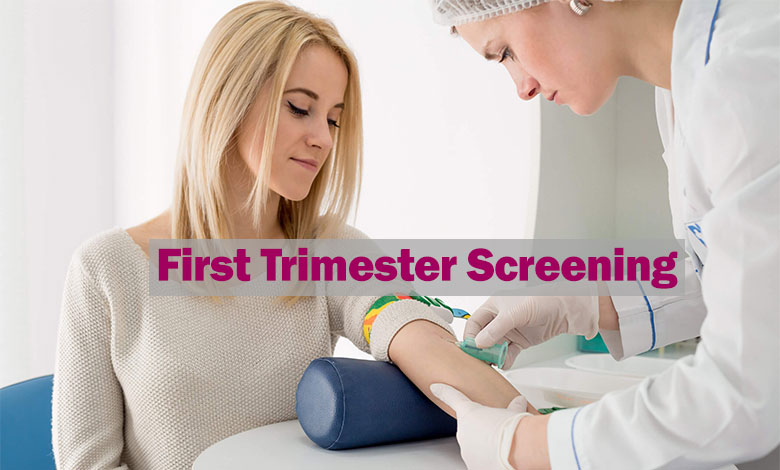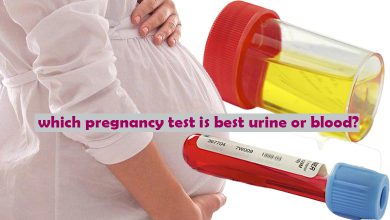First Trimester Screening

First-trimester screening is a set of tests that are performed during the first 12-13 weeks of pregnancy to assess the risk of certain chromosomal and genetic conditions in the developing fetus. These tests include a blood test to measure levels of certain hormones and proteins, and an ultrasound scan to measure the thickness of the nuchal translucency, a layer of fluid at the back of the baby’s neck.
The results of these tests, combined with other factors such as maternal age, family history, and medical history, can help healthcare providers determine the likelihood of the baby being affected by conditions such as Down syndrome, Edwards syndrome, and Patau syndrome.
Early detection of these conditions can help expectant parents make informed decisions about their pregnancy and prepare for the birth of a child with special needs.
What are the first-trimester pregnancy tests?
As we said, to check the health of the mother and the fetus, it is necessary to perform tests during the first trimester of pregnancy. These pregnancy tests show you the process of pregnancy and the development of the child.
Here are some of the most important prenatal tests that you may do in the first trimester of pregnancy:
A blood test is one of the tests for the first trimester of pregnancy
During one of the initial examinations, the doctor or midwife will check blood type and Rh factor, anemia, immunity against rubella (German measles), and test for hepatitis B, syphilis, HIV, and other sexually transmitted diseases.
Depending on your racial, ethnic, or family history, pregnancy tests, and genetic counseling may be recommended to assess your risk for diseases such as T-Sachs, cystic fibrosis, and sickle cell anemia (if these were not done at a previous visit).
Prenatal tests, including blood tests to check for diseases such as toxoplasmosis and varicella (the virus that causes chickenpox), may also be done if needed. It is also possible for the doctor to check the level of HCG, a hormone secreted by the placenta, or progesterone, a hormone effective in maintaining pregnancy.
Related posts: What is hCG urine pregnancy test?
A urine test is one of the pregnancy tests
Also, to look for signs of kidney infection or if necessary to confirm pregnancy by measuring HCG level, a urine test may also be requested as one of the tests of the first trimester of pregnancy. (HCG blood test can be used instead.)
Then, the urine sample is regularly collected to check the presence of glucose (a sign of diabetes) and protein, which can also indicate the presence of preeclampsia; A disease caused by pregnancy that is associated with high blood pressure.
Genetic testing is one of the pregnancy tests
In the next part, a genetic test is suggested for the tests of the first trimester of pregnancy. First, you need to decide whether you want genetic testing.
Some people believe that these pregnancy tests only cause unnecessary stress and prefer to be sure of the child’s genetic health after birth. Some people want to go ahead and do all the pregnancy tests, knowing that they are not 100% reliable.
Before proceeding, discuss the pros and cons with your doctor to see if genetic testing is right for you and your pregnancy.
There are various genetic testing options that include blood tests alone or with ultrasound, and there is no risk to the fetus. If the results of these first-trimester non-invasive pregnancy tests are not normal, further pregnancy tests are recommended. After that, you can decide if you want to do other pregnancy tests or not.
The first cycle genetic test, a combination of blood test and ultrasound to screen for Down syndrome, may be done between 11 and 14 weeks of pregnancy.
The results of a blood test that measures HCG or PAPP-A (pregnancy-associated plasma protein A) in the mother’s blood are done by measuring the skin on the back of the fetus’s neck (called nuchal translucency) through ultrasound.
This method may detect a significant proportion of cases of Down syndrome and other genetic problems. However, as with all screening methods, if the results are positive, a more invasive diagnostic method such as CVS is used.
Non-invasive laboratory screening (NIPT) is one of the pregnancy tests in the first trimester
This cell-free fetal DNA test can be done after 10 weeks of pregnancy. In this test, a blood sample is used to measure the relative amount of free fetal DNA in the mother’s blood. It is thought that this test can detect 99% of all Down syndrome pregnancies. It also tests for other chromosomal abnormalities.
Placental villus sampling (CVS) is one of the most important tests in the first trimester of pregnancy
If you are 35 years old or older, have a family history of certain diseases, or have a positive result in non-invasive genetic tests, this optional and invasive test is usually recommended between the 10th and 12th week of pregnancy.
CVS can detect many genetic defects such as Down syndrome, sickle cell anemia, cystic fibrosis, hemophilia, and Duchenne muscular dystrophy.
This procedure involves inserting a small catheter through the cervix or inserting a needle into the abdomen to sample placental tissue. This method has a 1% risk of miscarriage and is about 98% accurate in ruling out specific chromosomal defects at birth. But unlike amniocentesis, it does not help in diagnosing neural tube disorders such as spina bifida and anencephaly or abdominal wall defects.
What blood tests are done in the first trimester of pregnancy?
What is the normal range for First-trimester screening?
What does a positive first trimester screen mean?
How is an FTS test done?
Conclusion
In conclusion, first-trimester screening is an important tool for assessing the risk of certain chromosomal and genetic conditions in the developing fetus.
These tests can provide expectant parents with valuable information about their pregnancy and help them make informed decisions about their care. It’s important to note that first-trimester screening is not a diagnostic test and does not provide a definitive diagnosis of any condition.
However, it can help healthcare providers determine the likelihood of the baby being affected by certain conditions and guide further testing or monitoring.
Expectant parents should discuss first-trimester screening with their healthcare provider and consider the benefits and limitations of these tests in making decisions about their pregnancy.
